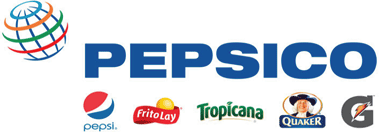Attached files
| file | filename |
|---|---|
| 8-K - FORM 8-K - PEPSICO INC | y86441e8vk.htm |
Exhibit 99.1

Purchase, New York Telephone: 914-253-2000 www.pepsico.com
Contact:
|
Investor | Media | ||
| Dylan Haverty-Stacke | Joe Jacuzzi | |||
| Director, Investor Relations | Vice President, Product & Brand Communications | |||
| 914-253-3899 | PepsiCo Beverages Americas | |||
| dylan.haverty-stacke@pepsico.com | 914-253-2350 | |||
| joseph.jacuzzi@pepsico.com |
PepsiCo Continues Bottler Integration
Gatorade to be distributed via direct store delivery system for select channels in 2011
Gatorade to be distributed via direct store delivery system for select channels in 2011
PURCHASE,
N.Y., Sept.1/PRNewswire — PepsiCo (NYSE:PEP) today announced a change of distribution for
its Gatorade products in the key trade channels of Convenience, UDS
(up and down the street) and
Dollar from a warehouse-delivered go-to-market system to direct store delivery through both
company-owned and independent bottlers in the United States and Canada. The company expects the
change to become effective January 1, 2011.
“This is a clear example of using PepsiCo’s broad set of go-to-market systems to best serve
our customers. We remain dedicated to the existing warehouse distribution system for some of our
beverage products, but the change to direct store delivery makes sense for Gatorade as we
redefine the sports nutrition category through the G Series,” said Massimo d’Amore, CEO of
PepsiCo Beverages Americas. “As a company, we are committed to bringing a wider variety of
products to market more quickly and efficiently than ever before.”
This will be the first large scale step
toward optimizing delivery systems resulting from
the bottling acquisitions earlier this year. The expected synergies related to these changes are
included in the company’s target of $400 million in pre-tax annualized synergies from the
bottling acquisitions once fully implemented by 2012.
“The
distribution of Gatorade in key trade channels of Convenience, UDS
and Dollar is well suited to the direct store delivery model due to its high velocity, so the
switch will result in better store-level customer service,” added Eric Foss, CEO of Pepsi
Beverages Company. “By achieving greater speed, simplicity and flexibility, we will be able to
better serve the current and future needs of both our retail customers and consumers in the
marketplace.”
Other PepsiCo brands that are warehouse-delivered to the key trade channels of Convenience,
UDS and Dollar, including Tropicana, Quaker and Naked Juice, will not be affected by this
change.
-more-
Gatorade — Page 2
About PepsiCo
PepsiCo offers the world’s largest portfolio of billion-dollar food and beverage brands,
including 19 different product lines that each generates more than $1 billion in annual retail
sales. Our main businesses — Frito-Lay, Quaker, Pepsi-Cola, Tropicana and Gatorade — also make
hundreds of other nourishing, tasty foods and drinks that bring joy to our consumers in more
than 200 countries. With annualized revenues of nearly $60 billion, PepsiCo’s people are united
by our unique commitment to sustainable growth, called Performance with Purpose. By dedicating
ourselves to offering a broad array of choices for healthy, convenient and fun nourishment,
reducing our environmental impact, and fostering a diverse and inclusive workplace culture,
PepsiCo balances strong financial returns with giving back to our communities worldwide. For
more information, please visit www.pepsico.com.
Cautionary Statement
Statements in this release that are “forward-looking statements,” are based on currently
available information, operating plans and projections about future events and trends. They
inherently involve risks and uncertainties that could cause actual results to differ materially
from those predicted in such forward-looking statements. Such risks and uncertainties include,
but are not limited to: changes in demand for PepsiCo’s products, as a result of changes in
consumer preferences and tastes or otherwise; damage to PepsiCo’s reputation; trade
consolidation, the loss of any key customer, or failure to maintain good relationships with
PepsiCo’s bottling partners; PepsiCo’s ability to hire or retain key employees or a highly
skilled and diverse workforce; unstable political conditions, civil unrest or other developments
and risks in the countries where PepsiCo operates; changes in the legal and regulatory
environment; PepsiCo’s ability to build and sustain proper information technology
infrastructure, successfully implement its ongoing business process transformation initiative or
outsource certain functions effectively; unfavorable economic conditions and increased
volatility in foreign exchange rates; PepsiCo’s ability to compete effectively; increased costs,
disruption of supply or shortages of raw materials and other supplies; disruption of PepsiCo’s
supply chain; climate change or changes in legal, regulatory or market measures to address
climate change; PepsiCo’s ability to realize the
anticipated cost savings and other benefits expected from the acquisitions of The Pepsi Bottling
Group, Inc. and PepsiAmericas, Inc.; failure to renew collective bargaining agreements or
strikes or work stoppages; and any downgrade of PepsiCo’s credit rating resulting in an increase
of its future borrowing costs.
For additional information on these and other factors that could cause PepsiCo’s actual results
to materially differ from those set forth herein, please see PepsiCo’s filings with the SEC,
including its most recent annual report on Form 10-K and subsequent
reports on Forms 10-Q
and 8-K. Investors are cautioned not to place undue reliance on any such forward-looking statements, which speak only as of the date they are made. PepsiCo undertakes no obligation to update any forward-looking statements, whether as a result of new information, future events or otherwise.
and 8-K. Investors are cautioned not to place undue reliance on any such forward-looking statements, which speak only as of the date they are made. PepsiCo undertakes no obligation to update any forward-looking statements, whether as a result of new information, future events or otherwise.
# # #
